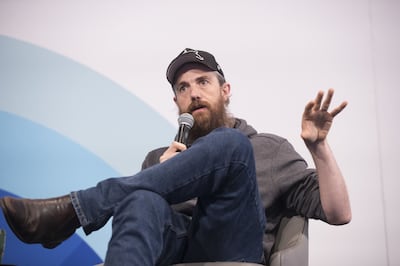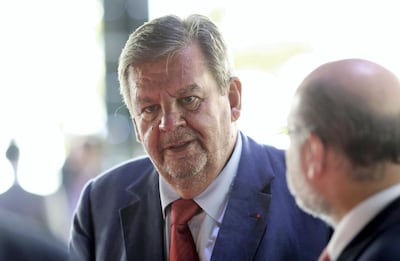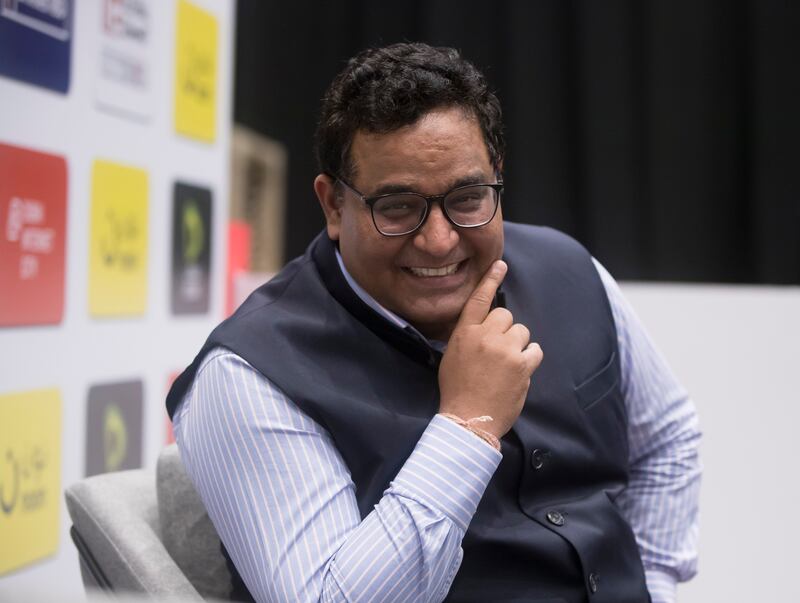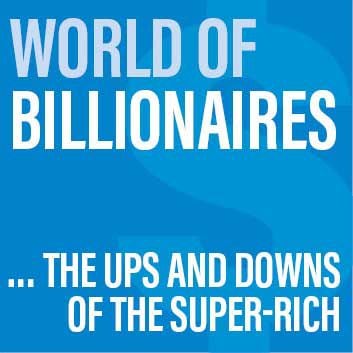Vijay Shekhar Sharma
Billionaire Vijay Shekhar Sharma, the founder and chief executive of India’s biggest digital payments company, said he will look to raise his stake as Paytm approaches profitability.
“There is never a day that I would not buy more equity in Paytm,” Mr Sharma said last week. “The single largest shareholder of Paytm is now an Indian – that is myself – and I believe this is definitely a key milestone.”
Mr Sharma became the biggest investor in Paytm, officially called One97 Communications, after he acquired shares from China’s Ant Group, according to a recent disclosure. Mr Sharma holds 19.42 per cent of the company, replacing AntFin, which now owns 9.9 per cent, as the top stakeholder.
Paytm, headquartered on the outskirts of New Delhi, will continue to build its payments businesses, including credit offerings, as it inches closer to profitability, Mr Sharma said.
The company, which also counts SoftBank Group among its backers, said in February it had achieved operating profitability before the cost of its employee stock ownership plan.
“The company is relentlessly focused on generating and earning every dollar it spends,” Mr Sharma said, declining to give a timeline for the company breaking even on an operating profit level.
Paytm’s monthly users jumped 20 per cent in the July to August period to an average of 94 million, it said in a statement last Tuesday. Loan disbursements, a key growth metric, more than doubled to 107.1 billion Indian rupees ($1.3 billion).
Also last week, Paytm unveiled a $12 device that allows customers to make payments by scanning a QR code or tapping cards on a reader, and alerts merchants when money is credited to their account. The machine accepts all major credit card networks, including homegrown RuPay.
Paytm competes with payments systems run by Alphabet’s Google and Walmart’s PhonePe in India’s fast-growing digital payments market. PhonePe also offers a smart speaker, similar to Paytm’s soundbox device.

Mike Cannon-Brookes
Billionaire Mike Cannon-Brookes is making new progress on plans to export clean energy from Australia to Singapore through a 4,200km submarine cable, after taking control of the stalled project.
Mr Cannon-Brookes’s Grok Ventures completed the acquisition of SunCable from administration and is advancing talks with authorities in both Singapore and Indonesia, the investment firm said.
Revised plans envisage building a manufacturing plant for high voltage subsea cables to serve both the project and energy transmission developments globally.
The plan “has all the component parts to make the next great Australian infrastructure initiative possible”, Mr Cannon-Brooks said in a statement on Thursday. “There’s huge upside for both Australia and our neighbours.”
Under a first stage, a vast solar farm in Australia’s Northern Territory – forecast by Grok to become the world’s largest – would deliver at least an initial 900 megawatts of electricity supply to local industry around Darwin and 1.7 gigawatts for export to Singapore. The project aims to subsequently add a further 3 gigawatts for Australian customers.
Watch: Check out these new solutions to the climate crisis
Check out these new solutions to the climate crisis

SunCable has been touted as among solutions to help Asia’s fossil-fuel dominated economies – particularly those with limited space for solar and wind farms – switch to cleaner electricity sources. Original developers saw the proposal as part of a potential super-grid spanning from Japan to India.
The initiative, which had an early price tag of A$30 billion ($19 billion), went into voluntary administration in January following a dispute between Mr Cannon-Brookes and fellow billionaire Andrew Forrest, then also an investor.
Mr Forrest – an advocate of exporting clean energy as green hydrogen or ammonia – argued the undersea cable plan wasn’t commercially viable.
SunCable’s proposal involves the use of existing technologies, and a high level of customer interest in Singapore shows others consider the strategy to be feasible, Mr Cannon-Brookes said.
“It is by far, I think, the cheapest way to export energy from Australia in volume and at affordable prices,” he said.
Grok aims to lodge a submission with Singapore’s Energy Market Authority for a conditional energy import licence this month, according to Mr Cannon-Brookes. Negotiations are ongoing with Indonesia over the use of its territorial waters to lay cables.

Johann Rupert
The founder and chairman of Richemont, the Swiss owner of jewellery and watchmaking company Cartier and other watchmakers including IWC and Vacheron Constantin, said inflation is starting to hit luxury demand in Europe.
Persistent higher prices are prompting even well-heeled European consumers to scale back buying, according to Johann Rupert, the controlling shareholder of the luxury conglomerate.
“In Europe, ongoing inflation is starting to impact local demand,” the billionaire South African told shareholders at the company’s annual meeting in Geneva last Wednesday.
Mr Rupert, who controls Richemont through a trust that owns the majority of voting shares, said European households in some countries were spending a higher percentage of income on basic necessities than they had in the past decade.
“We’ve seen the squeeze,” he said.
The company had warned in July that demand in the US and China, two of the biggest markets for luxury goods, was starting to sputter. Mr Rupert said the good news for European markets was that Chinese shoppers had begun travelling again.
Luxury sales boomed during and coming out of the pandemic as shoppers, helped by low interest rates and pent-up savings, splurged on pricey watches, handbags and jewellery. As central banks have swiftly raised borrowing costs to counter surging prices, Mr Rupert said he expects disruptions to persist.
“We cannot expect that after 10 years of excesses to return to normality in a year or two. It’s going to take longer,” he said.

Anil Agarwal
Indian billionaire Anil Agarwal’s Vedanta Resources and state-owned ZCCM Investments Holdings have resolved their disputes over a Zambian copper mining complex, following a four-year legal battle over its ownership.
Former Zambian president Edgar Lungu’s administration placed Konkola Copper Mines under provisional liquidation in 2019, after accusing Vedanta of lying about expansion plans and paying too little tax.
That sparked a series of court cases, culminating in Mr Lungu's successor, President Hakainde Hichilema, seeking to resolve the dispute amicably.
“All disputes between the parties have been resolved and all proceedings relating to the disputes will be withdrawn with each party bearing their own costs,” ZCCM said.
“Consequently, the KCM board will be reinstated and Vedanta Resources will return to its previous role as the majority shareholder of KCM.”
The deal is a victory for Mr Agarwal, who has been fighting to regain control of Konkola. It could also be a win for the Zambian government if Vedanta makes good on its pledge to invest $1 billion over five years to complete an expansion.
The world’s biggest miners are rushing to develop copper assets, as usage is projected to surge in electric vehicles and renewable energy.
Finalising a deal may contribute to reviving Zambia’s key copper industry, with the government projecting that output will decline to a 14-year low in 2023.
Mr Hichilema’s administration is targeting national production of 3 million tonnes annually by 2031, an almost fourfold increase from last year.
Before the liquidation process began, Vedanta held a 79.4 per cent stake in Konkola, with the state-owned company having the remainder.
The transition period for Vedanta to assume operational control of Konkola will take about three months, ZCCM chairman Kakenenwa Muyangwa said.
Reinstating Vedanta as Konkola’s majority shareholder is “a substantial step in the right direction”, said Pushpender Singla, director of Vedanta’s zinc unit.







